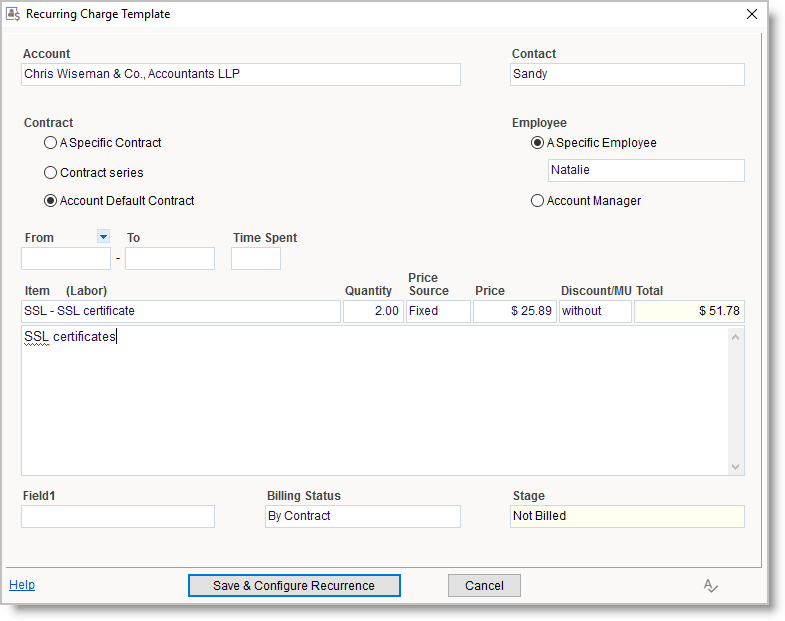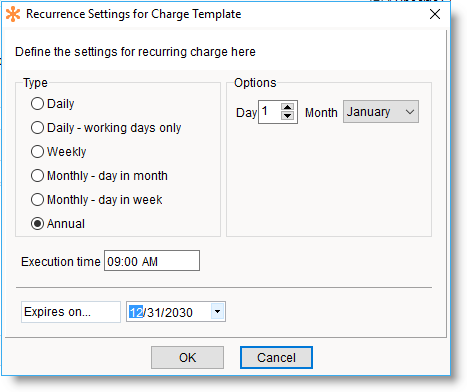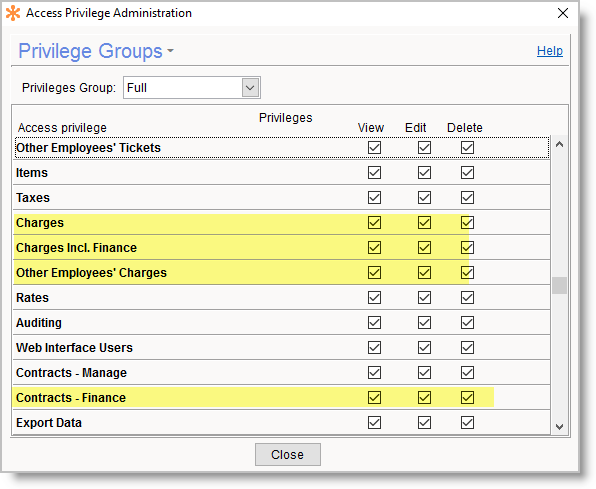Recurring Charges
Contents
Introduction
The Recurring Charges is an automated way to charge your customer for recurring services that do not require any additional overhead activities.
The Recurring Charges can be used to automatically charge customers for:
- monthly 365 subscriptions
- yearly domain renewals
- monthly hosting services
- yearly antivirus renewals
You can manage any number of recurring charges under each customer account.
Recurring Charges vs. Contracts and Contract-price Charges
In some case the new Recurring Charges feature may be used instead of Contracts and Contract-Price Charges.
Recurring Charges represent an alternative method to support automated recurring billing. They are easy to manage and track, and they are great when used for the correct use case.
When to use Recurring Charges and when to use Contracts?
Use Contracts with Contract-Price Charges in the following cases:
- When you need to track and limit time usage or total amount for the certain period (e.g. using the blocks of time or money).
- When your need to carefully decide what’s “covered” using Custom billing options as well as define billable-flag settings.
- When you need to assign tickets to specific billing arrangements (i.e. Contracts) and have special rates and prices.
- When the customer pays for a service agreement that additional activity may be reported on using labor, parts or expense charges.
Use Recurring Charges in the following cases:
- When the recurring charge at hand represents a granular service or product the customer pays for (e.g. domain name renewal or monthly hosting plan) unlike paying for an agreement or service contract that may cover additional activity logged by your team using charges.
- When the recurring charge at hand is not covered under the existing contract
Note: Customer may have Contracts running and Recurring Charges running. The two do not conflict and each offers its advantages depending on the case.
Setting up the Recurring Charges
Recurring Charges are automatically created by the 'RangerMSP Server' Windows service.
This Windows service must be installed on your server and must be running at all times in order for this feature to work.
If you already use the Email Connector or Alerts Server then you can skip this section as the RangerMSP Server service is already installed and there is nothing more you need to do besides defining the Recurring Charge Templates.
For installation instructions please review the Service Setup Guide.
Configuring a recurring Charge Template
Recurring charge templates can be managed using the main Charges window. You can also review customer specific templates under the customer Account Charges tab.
The recurring Charges are based on the templates that can be updated at any time and will affect the Charges created on the next cycle. In other words, you can change the quantities and/or price during the billing cycle, so next time a new Charge is scheduled to be created from the template, the new price/rate/quantity will apply.
The following table describes the recurring Charge Template fields:
| Field | Description |
|---|---|
| Account(mandatory) | Select the Account for the recurring Charge. |
| Contact | Select the Secondary Contact |
| Contract (mandatory) | |
| A Specific Contract | Select a Contract the Recurring Charge will be created under.
This Contract will be selected even if it will expire. |
| A Contract Series | RangerMSP will automatically pick the currently active Contract from the series when adding new recurring Charge to the Account.
(*) If no valid Contract will be found, the system will create the Charge linking to the System Global Contract. |
| Account Default Contract | The system will select a Default Contract for the new recurring Charge. See How does the system select a Default Contract
(*) If no valid Contract will be found, the system will create the Charge linking to the System Global Contract. |
| Employee | |
| A Specific Employee | Once a recurring Charge is assigned to an employee, this Charge will affect the employee’s working hours reports.
The Employee field can also be left empty, thus not assigning the Charge to any employee. |
| Account Manager | |
| From - To Time /Time Spent | Enter the From/To time or only the Time Spent for the Recurring Charge. |
| Item (mandatory) | An Item should be selected for each Charge from the Items List. Possible types: Labor, Expense and Product/Part.
Learn more about Items and their types in the Items section. |
| Quantity/Hours | Quantity refers to the number of items or amount of time spent on an Item which was selected in the Item field. |
| Price Source: | |
| By Item | The Recurring Charge will be created with the current Price/Rate set for the Item. This means that changing the Item price/rate or defining the custom rates for the Account/Contract will affect only new Charges created automatically in the next recurrence cycle |
| Fixed | The Recurring Charge will be created with the fixed price and will not be affected with the item price changes |
| Discount/Markup | You can define a discount/markup rate (in percentage or amount) for this Charge; this will be taken into account when calculating the total amount for the Charge. |
| Total Amount | This field is visible when the Fixed Price Source is selected. The total is calculated by the system. |
| Billing Status | This option determines the way the Billing flag of the Charge will be defined. The default behavior it to use the Contract’s settings (e.g. set all Charges as Not-Billable for a Block-Of-Money Contract, see more details in billable flag behavior). You can override the Contract behavior rules by setting this flag to either “Billable” or “Not Billable” for the Recurring Charge. |
| Stage Not Billed / Billed | The default option is to create the Recurring Charge as Not Billed.
The Charge may be automatically marked as Billed by the system once an Invoice was created in QuickBooks/Xero based on the billable charges in RangerMSP (see Using-QuickBooks Link) The Recurring Charge can be automatically created as Billed, in case its Billing Status was set as ‘Billable’ This will make the Charge read-only and will prevent it from being billed again or modified. |
Recurring Settings for Charge Template
- Set the Charge recurrence cycle, i.e. how often and at what exact time of day the Charge will be created. For example:
Monthly, every month on 10 day of the month at 9:00 AM.
The options change dynamically depending on whether you choose Daily, Weekly, Monthly, Annual type. - Set the expiration date for the Recurring Charge. After this date the Charge will stop being created. ‘Never Expire’ means that the Charge will keep being created for an unlimited time.
Permissions:
Managing Recurring Charge Templates requires the following permissions:
Charges, Charges Finance, Other Employees' Charges,Contract Finance


